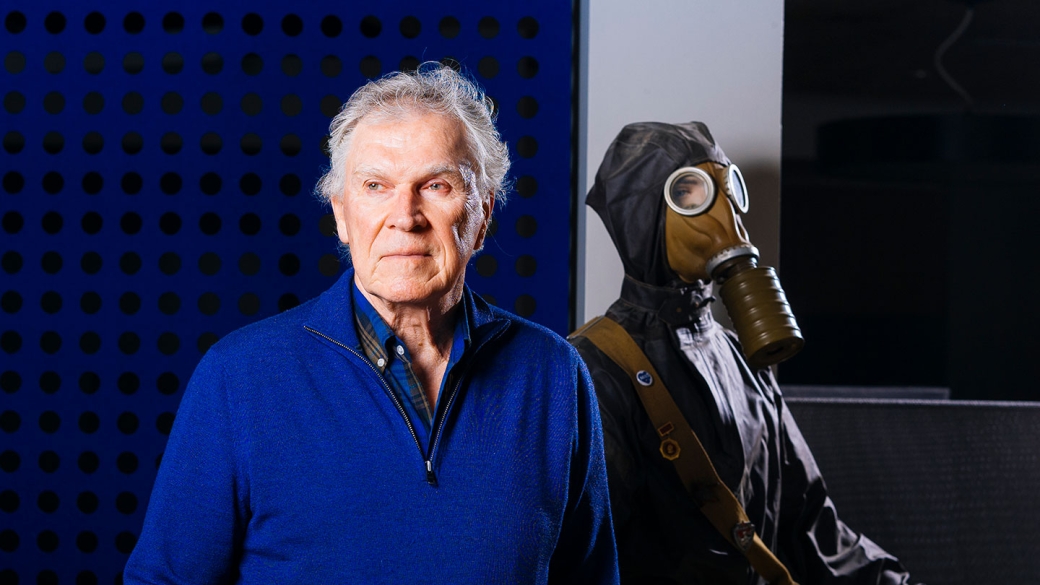A Conversation with Raymond Zilinskas
| by Eva Gudbergsdottir

Q. You have spent much of your career researching and analyzing some of world’s most nefarious chemical and biological weapons programs. What sparked your interest in this subject?
A. I had been working as a clinical microbiologist since earning my master’s degree in organic chemistry from the University of Stockholm and felt that my career had flattened out. At the time there was a lot of controversy surrounding DNA manipulation, and I was interested in the area where microbiological science meets policy and ethics. My dissertation explored issues generated by recombinant DNA research, including the applicability of genetic engineering techniques to biological weapons development.
Q. After Desert Storm ended, you served as a United Nations weapons inspector in Iraq in 1994. Did your findings in any way match the claims later made to justify United States military actions a decade later?
A. As a member of two United Nations Special Commission inspections, we went to all 82 biological institutes in the country, recorded dual-use equipment, and interviewed scientists. When I was in Iraq, its government still was lying about not having had a biological weapons program. So we were meeting lots of resistance when interviewing anyone. After my stay with UNSCOM was over, the situation changed because Hussein Kamel defected in August 1995 and informed UNSCOM about the Iraqi biological weapons program. Although Iraq was still holding back information about its program by the time that UNSCOM departed from Iraq in December 1998, UNSCOM findings had confirmed that Iraq’s chemical and biological weapons programs were defunct. In February 2003, I watched Colin Powell’s presentation to the U.N. Security Council at home and immediately knew that parts of it did not make sense. He should never have done it. It appears that he trusted the briefings he received from the CIA, but for unknown reasons did not consult with State Department experts who had been UNSCOM inspectors, and he also appears not to have had access to critical voices from within the Agency.
Q. Most of what we now know about the Soviet biological weapons program from its inception in the 1920s comes from the research you and Milton Leitenberg conducted for your book The Soviet Biological Weapons Program: A History (Harvard University Press, 2012). What surprised you most?
A. The first defector to provide inside information about the civilian elements of the program (called Biopreparat) fled to London in 1989. We gained even more insight three years later when Dr. Kanatjan Alibekov, the second in command of the Biopreparat program defected. That same year, Yeltsin admitted that it existed in violation of the Biological and Toxin Weapons Convention. So we knew that the Soviet biological weapons program was big. But I was surprised to learn how large it had been and how many thousands of people had been working on it.
Milton and I spent eleven years researching this book, and a lot of our information came from former Soviet weapons scientists. After the Soviet Union dissolved in 1991, many of the best ones had emigrated to the United Kingdom and Israel, and Congress had a program in the 1990s that made it easy for a select number of them to come to the United States.
I strongly believe that if we can prepare ourselves to guard against natural diseases then we can better respond to deliberate attacks.
Q. What has become of the Soviet biological weapons program in Putin’s Russia?
A. Truthfully, we don’t know. Russia now officially denies a biological weapons program ever existed, but there is no transparency and there is a lot that nobody outside Russia knows about. I am actually currently working on a book about the Putin administration’s views on biological security. It does not have a title yet, but in it I will try to make sense of Putin’s
puzzling activities related to the biosciences. On one hand, he has been reaching out to international organizations and promoting collaborations like the one between MIT and Skoltech. On the other hand, military and anti-plague institutions are completely closed to the outside world. One of Putin’s pre-election promises in 2012 was to develop weapons based on high technologies, including genetics. He now claims that it is a defense program, but that was not what he said then.
Q. You served as technical advisor on the most recent season of the acclaimed series The Americans. Are you happy with the outcome?
A. So far everything pertaining to microbiology has been technically correct. They have used many of my suggestions, both in relation to plausible plot lines and procedures. I enjoyed working with the writers, and they frequently called with more technical questions that I was happy to answer. They also took into consideration the historical accuracy I was able to provide about the Soviet program and the U.S. biodefense program (the U.S. terminated its biological weapons program in 1969). When I visited the set in New York, I met the episode’s director Daniel Sackheim and leading lady Keri Russell and saw the great care that show runners put into details and getting important facts right.
Q. It is safe to say that your field of expertise sounds scary to most of us. Is there anything that keeps you up at night?
A. I strongly believe that if we can prepare ourselves to guard against natural diseases then we can better respond to deliberate attacks. We don’t really know what the threat is, and therefore we have to be prepared for anything that nature challenges us with, particularly emerging and exotic infectious diseases.
For More Information
Eva Gudbergsdottir
evag@middlebury.edu
831-647-6606
